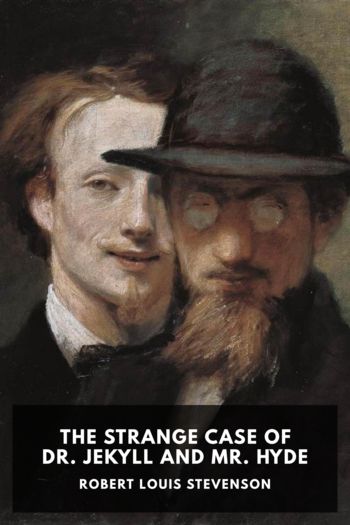Catriona by Robert Louis Stevenson (read with me .TXT) 📕

- Author: Robert Louis Stevenson
Book online «Catriona by Robert Louis Stevenson (read with me .TXT) 📕». Author Robert Louis Stevenson
In the press of my hurry, and to be spared the delay and annoyance of a guide, I had followed (so far as it was possible for any horseman) the line of my journey with Alan. This I did with open eyes, foreseeing a great risk in it, which the tempest had now brought to a reality. The last that I knew of where I was, I think it must have been about Uam Var; the hour perhaps six at night. I must still think it great good fortune that I got about eleven to my destination, the house of Duncan Dhu. Where I had wandered in the interval perhaps the horse could tell. I know we were twice down, and once over the saddle and for a moment carried away in a roaring burn. Steed and rider were bemired up to the eyes.
From Duncan I had news of the trial. It was followed in all these Highland regions with religious interest; news of it spread from Inverary as swift as men could travel; and I was rejoiced to learn that, up to a late hour that Saturday, it was not yet concluded; and all men began to suppose it must spread over to the Monday. Under the spur of this intelligence I would not sit to eat; but, Duncan having agreed to be my guide, took the road again on foot, with the piece in my hand and munching as I went. Duncan brought with him a flask of usquebaugh and a hand-lantern; which last enlightened us just so long as we could find houses where to rekindle it, for the thing leaked outrageously and blew out with every gust. The more part of the night we walked blindfold among sheets of rain, and day found us aimless on the mountains. Hard by we struck a hut on a burn-side, where we got a bite and a direction; and, a little before the end of the sermon, came to the kirk doors of Inverary.
The rain had somewhat washed the upper parts of me, but I was still bogged as high as to the knees; I streamed water; I was so weary I could hardly limp, and my face was like a ghost’s. I stood certainly more in need of a change of raiment and a bed to lie on, than of all the benefits in Christianity. For all which (being persuaded the chief point for me was to make myself immediately public) I set the door open, entered that church with the dirty Duncan at my tails, and finding a vacant place hard by, sat down.
“Thirteenthly, my brethren, and in parenthesis, the law itself must be regarded as a means of grace,” the minister was saying, in the voice of one delighting to pursue an argument.
The sermon was in English on account of the assize. The judges were present with their armed attendants, the halberts glittered in a corner by the door, and the seats were thronged beyond custom with the array of lawyers. The text was in Romans 5th and 13th—the minister a skilled hand; and the whole of that able churchful—from Argyle, and my Lords Elchies and Kilkerran, down to the halbertmen that came in their attendance—was sunk with gathered brows in a profound critical attention. The minister himself and a sprinkling of those about the door observed our entrance at the moment and immediately forgot the same; the rest either did not hear or would not heed; and I sat there amongst my friends and enemies unremarked.
The first that I singled out was Prestongrange. He sat well forward, like an eager horseman in the saddle, his lips moving with relish, his eyes glued on the minister: the doctrine was clearly to his mind. Charles Stewart, on the other hand, was half asleep, and looked harassed and pale. As for Symon Fraser, he appeared like a blot, and almost a scandal, in the midst of that attentive congregation, digging his hands in his pockets, shifting his legs, clearing his throat, rolling up his bald eyebrows and shooting out his eyes to right and left, now with a yawn, now with a secret smile. At times too, he would take the Bible in front of him, run it through, seem to read a bit, run it through again, and stop and yawn prodigiously: the whole as if for exercise.
In the course of this restlessness his eye alighted on myself. He sat a second stupefied, than tore a half leaf out of the Bible, scrawled upon it with a pencil, and passed it with a whispered word to his next neighbor. The note came to Prestongrange, who gave me but the one look; thence it voyaged to the hands of Mr. Erskine; thence again to Argyle, where he sat between the other two lords of session, and his Grace turned and fixed me with an arrogant eye. The last of those interested to observe my presence was Charlie Stewart, and he too began to pencil and hand about despatches, none of which I was able to trace to their destination in the crowd.
But the passage of these notes had aroused notice; all who were in the secret (or supposed themselves to be so) were whispering information—the rest questions; and the minister himself seemed quite discountenanced by the flutter in the church and sudden stir and whispering. His voice changed, he plainly faltered, nor did he again recover the easy conviction and full tones of his delivery. It would be a puzzle to him till his dying day, why





Comments (0)